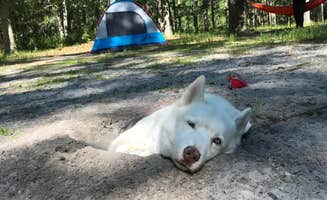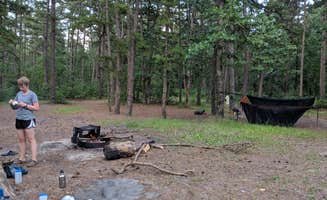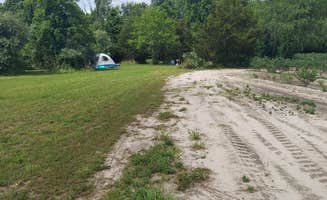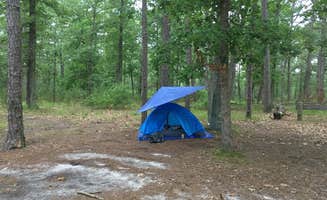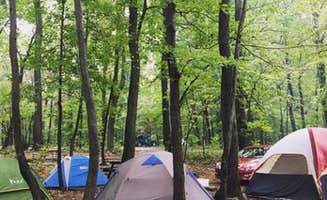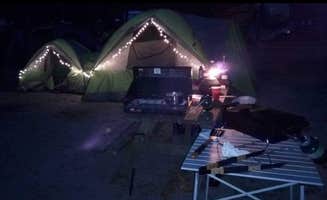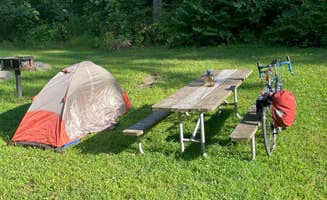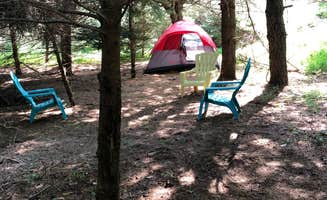Tent camping in the Moorestown, New Jersey region offers access to primitive hiking trails, diverse wildlife habitats, and seasonal water recreation opportunities. The area's coastal plain ecosystem features sandy soil with high water tables, creating distinctive camping conditions throughout the year. Most campgrounds remain frost-free until mid-October, extending the camping season into late fall.
What to do
Hiking the Batona Trail: The 50-mile trail connects multiple campgrounds with varied terrain and difficulty levels. At Batona Campground, one camper noted, "Hiking from the Batso Office to the Mullica River tent sites. Trail could get a tad sandy but it's well maintained. Would definitely come visit again and stay more than one night."
Birdwatching at Fort Washington: Located within driving distance of Moorestown, the park's observation deck provides excellent viewing opportunities. A visitor shared, "From this very spot you can view the beautiful raptors that migrate here on a seasonal basis in both the Spring and Autumn, wherein you can view their splendor from the wonderfully built Observation Deck."
Kayaking access points: Many sites offer direct water entry for paddlers. At Goshen Pond Campground, a reviewer mentioned, "Our site was right next to the Mullica River, and had excellent views if you walked just a couple steps from the tent. We were able to put our kayaks in right next to the site which was very convenient."
Historical exploration: The region contains significant Revolutionary War sites. At Washington Crossing State Park, "Every year, they re-enact Washington's troops crossing the Delaware! It was VERY cold the year I went. To warm up, there is a small visitor's center where they have a reproduction of the famous painting."
What campers like
Privacy between sites: Many tent campers appreciate the natural spacing at certain campgrounds. At Batona Campground, a reviewer stated, "While the individual campsites appear to be somewhat close together and the campground area is very open, there were few other campers during our visit, and privacy was not an issue."
Proximity to water: Several tent sites offer easy access to rivers and ponds. A visitor to Goshen Pond noted, "Our site was very quiet, but a lot of the sites are close together without any barriers, so if the campground got crowded it wouldn't be very private."
Flat terrain for tents: The natural geography creates ideal tent pads. One camper at Lower Forge Camp mentioned, "We were wholly unprepared to joke about it 8 miles to a campground, despite that and the thunderstorm, had an amazing time... Flat hike, if you like that. But great for being so close to the city."
Off-season solitude: Fall and winter camping offers peaceful experiences. A visitor to Goshen Pond shared, "This campground was mostly empty while we were there in August. Our site was very quiet, but a lot of the sites are close together without any barriers."
What you should know
Seasonal insect challenges: Ticks and chiggers are prevalent in warmer months. At Mullica River Campground, a camper warned, "NOTE: There are LOADS of ticks in this area. We camped here for one night on an overnight loop in Wharton State Forest. Wild blueberries abound during summer months!"
Water filtering requirements: Natural tannins affect water appearance. The same Mullica River reviewer advised, "Batsto River provides plenty of water for filtering--don't be weirded out by the brown color caused by tannins. River access at higher-numbered sites is marshy, water flow and quantity is more substantial downstream."
Permit and reservation systems: Most sites require advance booking through state systems. A camper noted, "Checking in is slow so come early."
Limited facilities: Many sites offer minimal amenities. A visitor to Batona Campground observed, "Bathrooms are very basic. Fresh water pump is located at entrance to campground. Each campsite is a cleared area with a fire pit."
Tips for camping with families
Beach and swimming options: Nearby lake facilities provide family-friendly water recreation. According to a Goshen Pond visitor, "It's also a 5 minute drive from Atsion lake, a great place for kayaking and swimming."
Educational opportunities: Historical sites offer learning experiences for children. A visitor to Ridley Creek State Park shared, "I had the best time here hiking up and down the mini mountains. The water was clear and beautiful and I absolutely loved it."
Trail difficulty considerations: Some paths are more suitable for younger hikers. One camper reported, "Trails vary in length but all are flat and easily accessible."
Wildlife viewing opportunities: The ecosystem supports diverse animal sightings. A camper joked, "You might even see the Jersey Devil :)"
Tips from RVers
Road conditions to tent areas: Access roads may challenge larger vehicles. A visitor to Evansburg State Park explained, "The only downside is having to haul gear by foot to the campsite. Some are further than others."
Parking limitations: Many tent sites require equipment to be carried in. A camper pointed out, "A larger RV would not fit. The unpaved road into the site is narrow and tree lined."
Seasonal access considerations: Sandy roads may be difficult after rain. One camper advised, "The road into the site is about 1 mile of loose sand. It can be accessed by a standard vehicle."
Walk-in distances: Plan for carrying gear to your tent site. A Goshen Pond visitor mentioned, "It's only a one minute walk from the parking area to the site."


